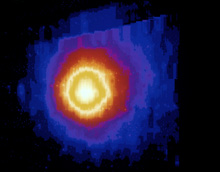As it often happens, you folks wake me up.
Should have given a heads up sooner.
This from Kendall.
------------------------
Hello all,
Here are some key links concerning the 2012 Transit of Venus:
Science @ NASA educational page: http://science.nasa.
Astronaut Don Pettit's Flickr photostream. He's the astronaut taking the photos:http://www.flickr.com/
Good NASA video on YouTube: http://www.youtube.
Official NASA page for the 2012 Transit of Venus: http://eclipse.gsfc.
...of interest.
-Kendall
Here are some key links concerning the 2012 Transit of Venus:
Science @ NASA educational page: http://science.nasa.
Astronaut Don Pettit's Flickr photostream. He's the astronaut taking the photos:http://www.flickr.com/
Good NASA video on YouTube: http://www.youtube.
Official NASA page for the 2012 Transit of Venus: http://eclipse.gsfc.
...of interest.
-Kendall
------------------------
And from NASA News.
-LRK -
-----------------------
From: NASA Science News <noreply@nasascience.org>
Date: Fri, Jun 1, 2012 at 2:18 AM
Subject: The ISS Transit of Venus
To: NASA Science News <snglist@nasascience2.org>
Date: Fri, Jun 1, 2012 at 2:18 AM
Subject: The ISS Transit of Venus
To: NASA Science News <snglist@nasascience2.org>
NASA Science News for May 31, 2012High above Earth, astronaut Don Pettit is about to become the first human to witness and photograph a transit of Venus from space. His images and commentary will be streamed to Earth during the crossing.
FULL STORY: http://science.nasa.
VIDEO: http://www.youtube.com/
This is a free service.
FULL STORY: http://science.nasa.
VIDEO: http://www.youtube.com/
This is a free service.
-----------------------
Even if you aren't prepared to view yourself we should have pictures to view.
When you think about how seldom we get to see this transit, it may make you wonder how the Kepler mission ever gets a chance to see a far off planet transit its sun with only a few photons being blocked by the planet.
Kepler hosts live brodcast of Venus transit.
- LRK -
-------------------------
May 31, 2012
The transit occurs when Venus passes directly between Earth and the sun. Viewers will see Venus as a small dot drifting across the golden disk of the sun. There have been 53 transits since 2000 B.C. The rare event occurs in pairs, with the last transit occurring June 8, 2004.
snip
Reporters must send requests for media credentials to Michele Johnson at michele.johnson@nasa.gov by 5 p.m. PDT Monday, June 4, 2012. Batalha and other NASA officials will be available for interviews beginning at 1 p.m. PDT in the Exploration Center.
WHEN: Tuesday, June 5, 2012 (all times PDT)
- 1:50 p.m.: Welcome from NASA Ames
- 2 - 2:30 p.m.: The Kepler Mission and the Transit of Venus, Natalie Batalha, Kepler mission scientist, NASA Ames
- 2:30 p.m. 8 p.m.: Solar observing and Hands-on activities
- 2:45 p.m. - 8 p.m.: Live NASA EDGE broadcast from Mauna Kea, HI
- 3:04 p.m.: Venus begins its six-hour transit
WHERE:
NASA's Exploration Center is the large white dome located at the main gate of NASA's Ames Research Center. To reach NASA Ames, take U.S. Highway 101 to the Moffett Field, NASA Parkway exit and drive east on Moffett Boulevard towards the main gate and bear right into the parking lot.
For more information about the worldwide events, safety precautions for viewing, educational content and social media activities, visit:
http://venustransit.nasa.gov
The public can follow the event on Twitter on #VenusTransit and download a free mobile app at:
http://venustransit.nasa.gov/
WHEN: Tuesday, June 5, 2012 (all times PDT)
- 1:50 p.m.: Welcome from NASA Ames
- 2 - 2:30 p.m.: The Kepler Mission and the Transit of Venus, Natalie Batalha, Kepler mission scientist, NASA Ames
- 2:30 p.m. 8 p.m.: Solar observing and Hands-on activities
- 2:45 p.m. - 8 p.m.: Live NASA EDGE broadcast from Mauna Kea, HI
- 3:04 p.m.: Venus begins its six-hour transit
WHERE:
NASA's Exploration Center is the large white dome located at the main gate of NASA's Ames Research Center. To reach NASA Ames, take U.S. Highway 101 to the Moffett Field, NASA Parkway exit and drive east on Moffett Boulevard towards the main gate and bear right into the parking lot.
For more information about the worldwide events, safety precautions for viewing, educational content and social media activities, visit:
http://venustransit.nasa.gov
The public can follow the event on Twitter on #VenusTransit and download a free mobile app at:
http://venustransit.nasa.gov/
-------------------------
Here is to looking up, and thanks for looking up with me.
- LRK -
Web Site: http://lkellogg.vttoth.
BlogSpot: http://
WordPress: http://lrkellogg.
RSS link: http://
Newsletter: https://mailman1.
==============================
Web Site: http://lkellogg.vttoth.
BlogSpot: http://
WordPress: http://lrkellogg.
RSS link: http://
Newsletter: https://mailman1.
==============================
snip
Much of the world can witness the 2012 transit of Venus. The date depends on what side of the International Dateline you will be observing. Observers in North America will see the transit in the evening on June 5, 2012, through sunset, so you want to have a clear western horizon.
Read More
Read More
snip
==============================
The next transit of Venus, when the planet Venus will appear as a small, dark disk moving across the face of the Sun, will begin at 22:09 UTC on 5 June 2012, and will finish at 04:49 UTC on 6 June.[1] Depending on the position of the observer, the exact times can vary by up to ±7 minutes. Transits of Venus are among the rarest of predictable celestial phenomena and occur in pairs eight years apart[2]: the previous transit having been in June 2004, the next pair of transits will not occur until December 2117 and December 2125.
snip
==============================
==============================
When Planets Align: Venus Crosses the Sun.
snip
==============================
WHAT THE MIND CAN CONCEIVE, AND BELIEVE, IT WILL ACHIEVE - LRK -
==============================
==============================
WHAT THE MIND CAN CONCEIVE, AND BELIEVE, IT WILL ACHIEVE - LRK -
==============================





No comments:
Post a Comment
Note: Only a member of this blog may post a comment.